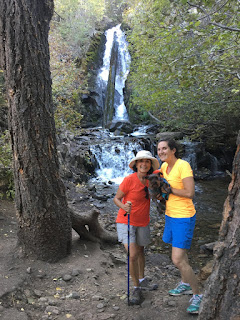You balance it on your head
A heavy bucket
Full of water from the pump
Standing straight and tall
Walking with your head held high
Some, they don't see this crown
They think you are not fit
To be a queen
You are not worthy
Of learning, of reading, of owning, of being
They send the boys to school
As they run past you on the dusty road
Laughing
Not recognizing
You are the backbone
Who wears a crown
With no jewels or gold
But worth kingdoms
Not realizing
You carry their weight on your shoulders
And the future on your back
I wrote this months ago during our stay in the village, but the longer I'm here, the longer it resonates with me as I see what it means to be female in Malawi.
Peace Corps (per the United Nations) is in the middle of 16 days against gender violence. I wish I could say I haven't seen any gender violence here, but unfortunately I have. On my on call shifts I have to medically examine girls who come in for "defilement" or sexual abuse. I have heard their testimonies, interpreted for me by our registrars, many of them who are young females, so I'm sure it's not easy for them to hear firsthand these accounts of terrible events. Groups of boys jumping and sexually assaulting a girl on her way home from school, a neighbor who raped a developmentally delayed girl, among others. It is frustrating to say the least. I am so happy to work in a hospital that has a One Stop Center, UNICEF-created clinics where victims of rape can go for healthcare, exams, and counseling. Police reports are filed, though I have no idea what happens from there.
I have been amazed here at everything women do. From a young age, girls do everything. During our stay in the village, I saw the women of the community run the house. And by women I mean any female over the age of about 5-6 years old. They are outside by dawn, sweeping the floor, washing dishes from the night before, fetching water, starting the cooking for the morning. Girls do go to school, but during their time off, they are busy. And they can balance almost anything on their head.
When we were at the lake last weekend, we were constantly swarmed by young boys whenever we got in the water. Laughing, swimming around us, trying to see who could swim the farthest. The girls were on the shore doing laundry, occasionally getting in the water to fill buckets, but they did not stay long. The boys can run and play and waste time. The girls work.
During these 16 days, I have learned more facts about girls and women in Malawi. Half of girls in here are married before they are 18. Young women 18-24 also make up 58% of Malawi's HIV infections. Most girls do not complete their schooling and only 67% of women are literate.
There are two bills currently being proposed in Malawi's government that are being protested. One is the right for a woman to terminate pregnancy, the other is to make homosexuality legal. I read an article the other day from an extremely conservative newspaper here discussing how abortion is the gateway to "widespread euthanasia" and other "forms of murder and brutality" (Termination of pregnancy bill). This is happening in a country where contraceptive rates are 46% and the average number of children per woman is over 5.
The BBC published an article about ritual sex practices in Malawi if you haven't seen it: The man hired to have sex with children. Recently it was updated that he was sentenced to 2 years in jail and hard labor.
Despite how awful most of this sounds, I am happy to be part of an organization that works hard to empower girls and improve the status of women around the world. I also work alongside Malawian female physicians who stand up for the mothers and children we see everyday. They are role models for our patients and girls all over Malawi. There is still so much work to be done.
Thanks for reading and supporting me while I'm here. I'll post pictures some other time, they didn't seem to fit with the theme of this post. Or follow my instagram (bananneka). I post things there from time to time :)










































